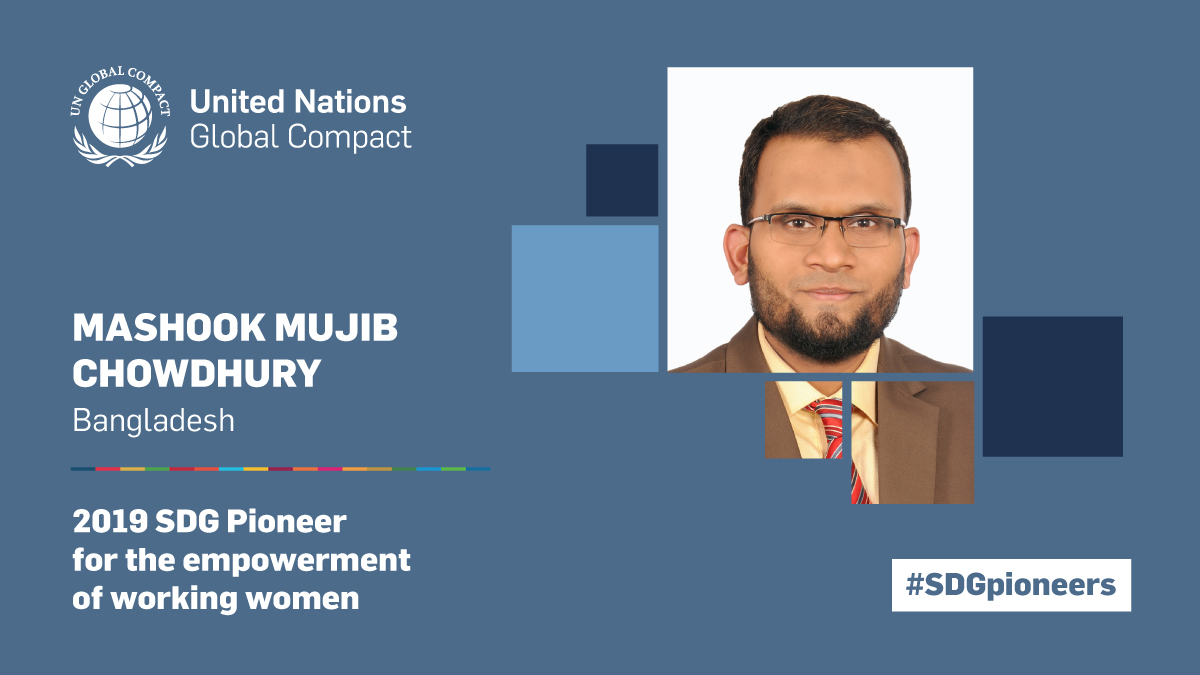An SDG Pioneer for the empowerment of working women

Mashook Mujib Chowdhury is helping empower women working at one of Bangladesh’s largest apparel and textile companies.
As Manager, Sustainability at DBL Group, Mashook is successfully juggling multiple projects that support women by improving their health and hygiene, sending their children to school and developing their careers. Mashook bonds the company’s power and resources with local and global partners to actively advance five Sustainable Development Goals: Goal 1 (No Poverty); Goal 3 (Good Health and Well-Being); Goal 4 (Quality Education); Goal 5 (Gender Equality); and Goal 8 (Decent Work and Economic Growth. At the same time, women and their children are healthier and happier people and better workers.
For example, the non-governmental organization Phulki (which means “spark” in the Bangla language) provided 6,500 women with sexual and reproductive health rights training through the “Nirapod” programme, supported by the Netherlands Government. DBL is also providing women with subsidized sanitary napkins at a cost of only 12 cents a pack, a subsidy of 75 per cent of the local market. This helps reduce women’s absence from work.
Mashook began working with the giant apparel and textile manufacturer, which supplies products to global retailers like H&M, Walmart (George, UK), Puma, Esprit, G-Star, M&S and C&A, six years ago. Since 2014, he has led the expansion of the company’s Bandhan Fair Price Shops. Established in 2008 to give workers in remote factories access to affordably priced basic household, food and health items, DBL now has seven shops in different factory complexes. Bandhan sells goods at less than the usual market price and DBL employees can buy items on credit without being charged interest. This project enhances Goal 1 and Goal 8.
Mashook guides the DBL into consistent relationships with stakeholders, such as UNICEF, UNDP and GIZ, to extend the achievement of the Global Goals. He has successfully woven the Ten Principles into garment factory policies, practices and sustainability strategies.
For example, the Female Supervisory Leadership Programme upholds the human rights directives of Principles 1 and 2 as female employees feel more comfortable sharing grievances with women supervisors. The programme also boosts women’s career prospects by helping them move into supervisory positions and, possibly, management slots. Educational support for workers’ children encourages the children to stay in school and out of the workplace, upholding Principle 5’s directive to abolish child labour. DBL adheres to the UN Global Compact’s environmental principles with multiple environmental practices that reduce the impact of its use of raw materials and resources.
DBL has been a participant of the United Nations Global Compact since 2013 and is a founding member of the Global Compact Network Bangladesh. Mashook has led the development of the company’s Sustainability Reports since its participation began.
The company has also signed an agreement with a Global Compact Network Bangladesh member, CSR Centre, and amfori, a Brussels-based global business association that supports open and sustainable trade, to create the Shobola Project, a women’s empowerment program. DBL is providing technical support for the project, which began this year and will help local factories train female supervisors.
Shobola has been inspired by DBL’s Female Supervisor Leadership Programme.
Mashook is 35 years of age.
